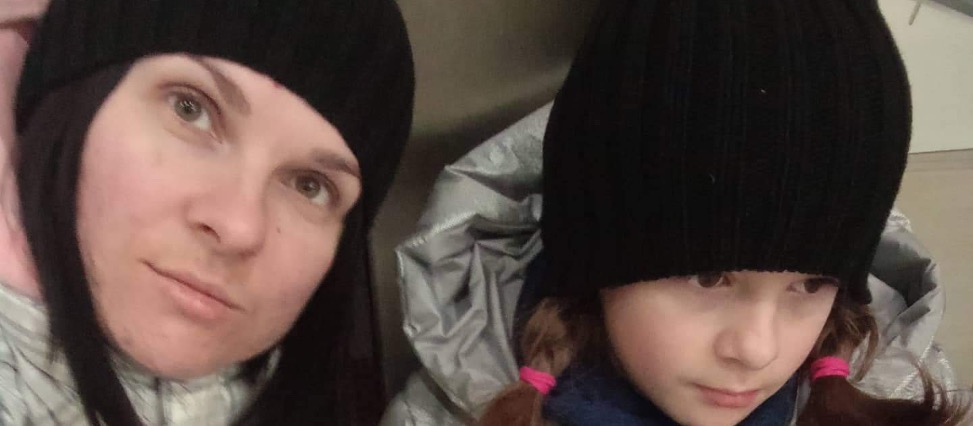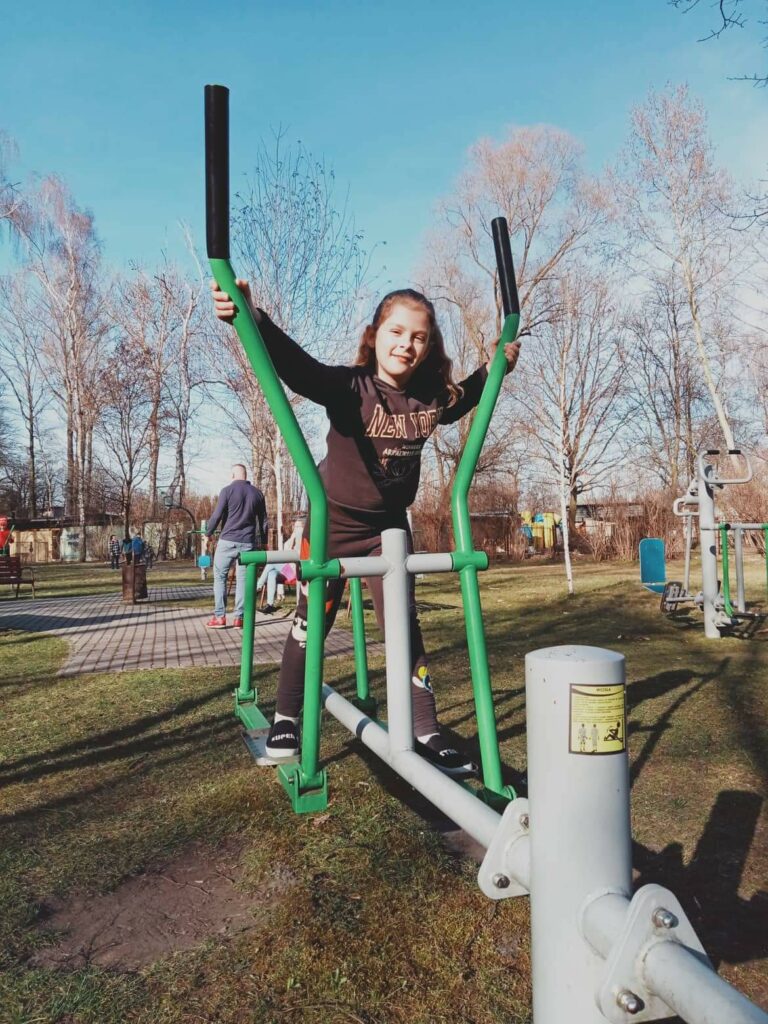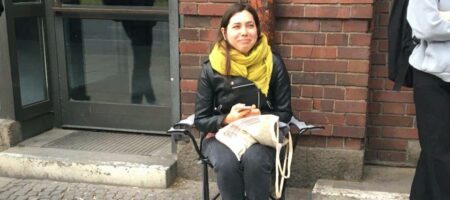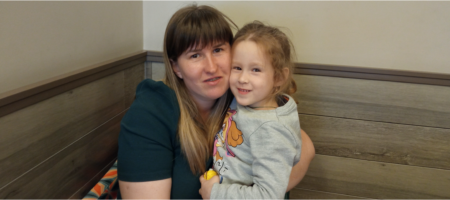Olga sits in a large chair, ready to tell her story. She is staying with a friend. In the background her daughter, who is nine years old, plays and chatters with a friend.
My immediate family is very small; it’s just my daughter and me.
Olga and her daughter lived in Mykolaiv in southern Ukraine. They had a simple but settled life. Olga’s job at a grain processor was stable and her daughter enjoyed school. In their free time they would have a lot of fun together, walking, playing sports and meeting friends.
Our life was well-planned and stable. We were dreaming of taking a holiday, but that won’t happen now.
Waking up with a terrifying start at 4:30am, on the morning of February 24, Olga could hear sounds like bombing outside. She immediately understood that the war must have started. But she still didn’t realise the magnitude or the danger of the situation. She laughs as she recounts the first thought that came into her mind:
My first thought was, ‘how should I get to work?’
Having spoken with friends, the reality of what was happening sank in. She felt at a loss about what to do. Olga didn’t what she was meant to do; she didn’t know whether she could go outside.
In the early days, Olga and her daughter would venture outside to the supermarket. There were long queues all around the shops. People were panicking and trying to buy as much food as possible, so there wasn’t much choice and Olga couldn’t buy everything that she and her daughter needed. During this time, the city was blocked to try to prevent the enemy’s invasion, so few deliveries of food were reaching the shops.
Our neighbours, who had sugar and flour reserves at home, were sharing everything out among us all.
Fortunately, the situation with food settled down before they had to go completely hungry. But they often didn’t have electricity or water in the building due to the destruction that was being caused in the city. They were using candles and just trying to maintain normal living as best they could.
There was no bomb shelter in Olga’s building, just a cellar that wasn’t fit to be used as a shelter.
It felt safer to stay in our flat and like the cellar would be more dangerous.
Olga’s flat was on the fifth floor of the building. During air raids she would take her daughter to a long corridor in the middle of the building, often taking pillows and warm clothes, too.
Local people were organising security patrols in the neighbourhood. But as the situation progressed it became more dangerous to be outside. If Olga had to leave the flat to buy food she would leave her daughter at home because shooting could start at any moment.
Our men did their best to protect us.
Despite the fear and danger, Olga didn’t plan to leave the city. She hoped everything would be finished quickly and that they just had to wait things out. Another key reason for staying was Olga’s parents. They live in a small village near Mykolaiv. They are old and need care and support,and they were standing firm and refusing to leave their native home.
One morning, Olga and her daughter were awoken by a roaring noise outside. When they looked, they saw that the sky was burning. Their building was shaking. The bombing had moved even closer to their home and, at this point, Olga’s fear for her child made her take the decision to flee.
Conveniently, there were buses in the city that had been organised to take the citizens to safer places. On 10 March at 6am, Olga and her daughter began their journey.
There were very long queues for the buses and it was a bitterly cold day. First, they let all the women with babies board. When Olga and her daughter were finally able to enter a bus they found that there were no seats left, but they squeezed into a spot near the driver and sat on their bags. Ten buses, in total, were driving people from Mykolaiv to Odessa railway station. When they arrived at the station there were volunteers there to meet them, providing food, hot drinks and a place to rest and get warm. Olga says she is forever grateful to those people for their help and support. People seemed lost and were either just sitting or where running round in a panic.
Our kids became friends and were playing with each other. That was the only thing that was creating a bit of a better mood.
The next day, Olga heard that a bomb had gone off in a playground hear their apartment block in Mykolaiv and the windows of their flat were broken.
There were some trains taking people to Lviv, but all of them were overcrowded. Olga decided to wait for a later one, which arrived at 23:30. There were far fewer people travelling, so she believed that they would be able to journey in relative comfort – and perhaps get some sleep. Just as the train left the station they heard a loud explosion nearby.
It seemed like the war was chasing us.
Olga was told that the train wouldn’t be able to get to Lviv because of overcrowding at the station, so it stopped earlier in a small, unknown village. Olga and her daughter were very tired.
Every sound woke us up and the first thing that screamed into our minds was ‘BOMB’. It was impossible to sleep.
They followed others who seemed to know the area better and found a volunteer station. There were private buses headed to Poland. Olga doesn’t remember the route of the bus or the name of the border they crossed; she was just so exhausted. At the border, they spent six hours in a queue, although documents were being checked quickly. They discovered that they were in Krakow. It was chaotic. People were running around in different directions and some were just sleeping on the floor of the railway station. Olga remembered that she had a friend in Poland and managed to make contact with her. The friend invited them to stay with her in the town of Zabrze. Olga had no idea how to get there and had to ask local people in the street for directions, trying to guess what they had answered in the unfamiliar language.
I was afraid I would take the train to the wrong side of the country.
They travelled to Katovice from Krakow and Olga’s friend met them there and took them to the destination of Zabzhe. In total, Olga and her daughter’s journey took three days.
All the time you’re moving you’re not really thinking about what is happening. But when you stop it’s really frightening; that’s when reality sinks in.
Now, Olga and her daughter are still staying with Olga’s friend. They are safe, but Olga’s greatest wish is to return home. She begins to cry when she things about her parents, who remain in their village outside of Mykolaiv.
I feel guilty that I left my parents and that I’m here safe and they are still in danger.
Olga is thinking about returning home soon. The company where she works will be operating again, so she is hopeful. But, she says, the sounds of bombs and explosions, and the fear she felt as Russian military planes flew over her home, still haunt her.
I want to wake up one day and see that everything has finished as quickly as it started.
Posted on April 20th, 2022
Voices Ukraine




